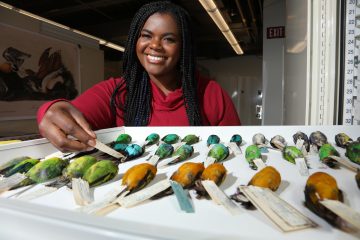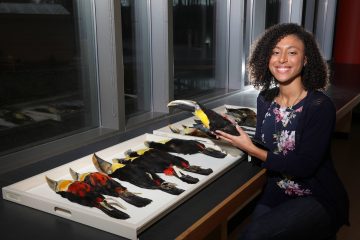Nearly 1,000 Gather for Conversation on Safer Fieldwork
March 8, 2021
By Katya Hrichak
It all started with a question: “What do you do to stay safe in the field?”

Witnessing incidents of violence against people of color in the media, two ecology and evolutionary biology doctoral candidates decided to create a set of best practices on how researchers can stay safe while conducting fieldwork. What started as a list for their graduate field transformed into much more when Monique Pipkin and Amelia-Juliette Demery’s ideas began resonating at Cornell and beyond.
The journal Nature Ecology and Evolutionary Biology published their paper, “Safe fieldwork strategies for at-risk individuals, their supervisors, and their institutions” in October; but even then, the two knew they were not finished.
A paper presentation and panel discussion with disciplinary experts followed in mid-February, addressing the risks associated with conducting fieldwork in locations where misunderstandings with police and locals, for example, could lead to difficulties. As the students explained, conducting fieldwork in an unfamiliar environment and/or around unknown people can put any researcher in a position of risk. The event brought nearly 1,000 scholars from across the country into the conversation.
“Researchers and supervisors must work under the expectation that prejudice can arise in any situation, and the repercussions for experiencing that risk can be equally diverse in how they manifest,” Demery told the audience over Zoom.

Through their presentation, Demery and Pipkin defined what it means for a researcher to be at-risk, described several unsafe fieldwork scenarios, and provided actions researchers can take to reduce risk in any location. Engaging in fieldwork with another person, carrying credentials, and wearing identifying clothing are just a few of the strategies they identified, all of which, they said, should be discussed and planned in advance.
Their audience submitted over 100 questions and joined the conversation by tagging tweets with #saferscience.
Recognizing graduate students’ requests for more conversations on safer fieldwork as well as equity in STEM, a book talk with Julie Posselt, associate professor of higher education at the University of Southern California and author of “Equity in Science: Representation, Culture, and the Dynamics of Change in Graduate Education” was offered earlier in the day.
While the students’ presentation focused primarily on external factors researchers should be aware of and prepare for, Posselt’s talk addressed the internal complications that can arise when conducting fieldwork with others from the same institution or program.
Posselt explored the simultaneously inclusionary and exclusionary nature of working in the field, potentially problematic boundaries and power imbalances between researchers, and hesitancy in reporting troubling occurrences, all of which she saw in two university fieldwork courses she observed for book research.
“If the little things are never talked about, then they become part of the culture itself,” Posselt cautioned. She encouraged those in attendance to pay attention to the words and actions of those around them and use reporting to help change policy.
“It’s when people begin to take responsibility for their actions and the actions of their organization that they can move forward together,” she said.
Recordings of both talks are now available through Cornell’s Video on Demand. Become part of the conversation by watching the Equity in Science Book Talk with Author and Professor Julie Posselt and Safer Science: Strategies to Protect at-risk Researchers when Conducting Fieldwork, learn more on the CALS’ Safer Science webpage, and watch the Twitter hashtag for additional Safer Science presentations planned at other universities.
“There’s no way to eliminate all risk during fieldwork,” said Pipkin. “We cannot control the actions of others, but we can best prepare ourselves to mitigate risk when we encounter it.”
Safer Science was co-sponsored by the College of Agriculture and Life Sciences’ Office of Diversity and Inclusion and the Graduate School’s Office of Inclusion and Student Engagement (OISE). Equity in Science was co-sponsored by OISE and the Graduate School’s Future Faculty and Academic Careers.
Both events were supported in part by funds from the National Science Foundation (NSF) under Grant No. 1647094 (AGEP CIRTL). Any opinions, findings, and conclusions or recommendations expressed in these events are those of the authors and do not necessarily reflect the views of the NSF.
